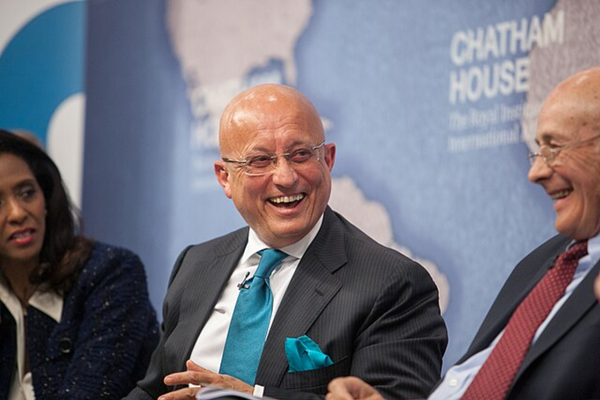
New York’s most famous venue for Shakespeare in the Park has returned, and with it the grand tradition of waking up at 4am and/or sleeping on the ground in order to score free tickets to star-studded theater. The Delacorte, an open-air amphitheater in Central Park, paused its annual outdoor series of high-profile and free summer shows in 2024 to continue with a renovation, and now returns, refurbished – and temporarily restocked with a bunch of familiar faces. For their production of William Shakespeare’s Twelfth Night, the Public Theater has snagged Peter Dinklage, Sandra Oh, Jesse Tyler Ferguson, Daphne Rubin-Vega, singer/actor Moses Sumney, and Lupita Nyong’o in the central role of Viola, opposite her real-life brother Junior as Viola’s twin Sebastian.
The Nyong’o siblings and director Saheem Ali all grew up in Nairobi, Kenya, and there are snatches of Swahili dialogue from Viola and Sebastian, separated via shipwreck as the play opens. Viola washes ashore on the coast of Illyria, afraid that Sebastian may be dead. She disguises herself as a man called Cesario and takes a job serving Duke Orsino (Khris Davis), who uses Cesario to send messages to Olivia (Oh), who he loves. Olivia falls in love with Cesario/Viola, who falls in love with Orsino, who still pines for Olivia. Olivia also figures into a comic subplot, where Sir Toby (John Ellison Conlee) and his sidekick Andrew (Ferguson), hedonists both, play a vengeful trick on Malvolio (Dinklage) for spoiling their fun. They convince Malvolio that Olivia loves him, sending him on a mission to seduce her, which prompts her to think him mad. Sebastian turns up, too, though his role is secondary. This is a somewhat abbreviated production, cut down to under two hours, no intermission and not a lot of breathing room.
Returning to that Swahili dialogue: it provides lovely grace notes, and some genuine moments of pure acting for an audience that may not know the play nor the language by heart (or at all). It also underlines, presumably unintentionally, the sameness of some of the show’s other performances. Everyone in it is quite funny and charming; the cast also tends to goose laughs by juxtaposing modern emphases and gestures with the Elizabethan verse. This helps bring some of the meaning across in a playful way, and garners plenty of big laughs. It also sometimes wears thin despite the variety of characters and actors the show employs.
It’s probably no accident that the cast members who most stand out are on opposite poles from this energized but generic approach. Nyong’o has plenty of comic moments where her Viola-as-Cesario must perform a cartoonish version of masculinity, perhaps not so much less restrained than Orsino’s preening “real” version, backed up by a crew of macho yes-men. (In one of the better physical running gags, a stern look from Orsino sends one of them into repeated, punitive push-ups.) But she has room, too, for quieter moments of real sincerity, and sells a love story with Orsino that, in this telling at least, would otherwise feel barely-there. She anchors a production that otherwise prioritizes shtick and showmanship.
Dinklage, meanwhile, goes further into full-bodied comedy than his co-stars, who are already plenty committed. He does a terrifically inventive job turning Malvolio’s officiousness – the quality that so irritates Sir Toby and Andrew – into a precise form of romantic delirium. While some of the other players give their deliveries some modern punctuation, Dinklage is doing something bolder and more dexterous with his physicality and his distinctive voice. Malvolio’s pompousness takes on a kind of deranged purity; he may have broken up other characters’ revelry, but he’s willing to give his full, hilariously annoying self to Olivia. His subsequent imprisonment later in the show has more pathos than most (all?) of the romantic entanglements; Dinklage is simply a joy to watch.
He and Nyong’o aren’t the only joy in the show; when they’re both offstage, there’s plenty more entertainment from the talented cast and in the show’s outdoor crispness. But Ali seems to emphasize the fun of Twelfth Night rather than complicate or fully interrogate it (despite one role, Sebastian’s faithful friend Antonio, given a more romantic subtext by the non-binary performer, b). A few bits and pieces of scenic design appear and recede elegantly from below the stage, but the permanent set is just the letters spelling out WHAT YOU WILL – the play’s subtitle – at the rear of the stage, subject to a few funny sight gags but mostly bringing to mind the Robert Indiana “LOVE” statue (or an Instagram station). The grand finale features an explosion of eye-filling costume design, but what does it have to do with the rest of the show, beyond the underdeveloped moments of gender performance?
Then again, maybe it’s appropriate that Shakespeare returns to Central Park with a reminder that his work can be delightful fun, especially with a play that does refer to its own stage-friendly qualities. “If this were play’d upon a stage now,” the character Fabian remarks at one point, “I could condemn it as an improbable fiction.” It would be hard to do that for this Twelfth Night. Nitpick, maybe, but not condemn; it’s entirely probable that the crowds bearing their hard-won tickets will have a great time.







